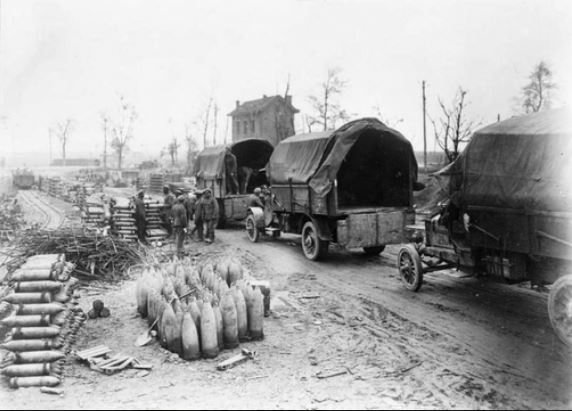Difference between revisions of "1st Division Ammunition Column"
From Our Contribution
| (One intermediate revision by the same user not shown) | |||
| Line 26: | Line 26: | ||
===Unit Personnel=== | ===Unit Personnel=== | ||
| − | * [[Sydney Scott]] 21 Apr - 31 Dec 1918 | + | * [[Josiah James Skinner]] 4 Section - 17 Aug 1914 - 25 oct 1916 |
| − | + | * [[Percival Charles Witney]] 3 Section - 10 Feb 1916 - 18 Apr 1917 | |
| + | * [[Sydney Scott]] 21 Apr - 31 Dec 1918 | ||
===Individual Honours=== | ===Individual Honours=== | ||
| Line 33: | Line 34: | ||
* 18 x Military Medal | * 18 x Military Medal | ||
* 3 x Meritorious Service Medals | * 3 x Meritorious Service Medals | ||
| − | * 6 x mentioned in | + | * 6 x mentioned in Despatches |
* 2 x Belgium Croix de Guerre | * 2 x Belgium Croix de Guerre | ||
Latest revision as of 17:51, 24 March 2021
 | |
 Shoulder patch | |
Brief History
The 1st Division Ammunition Column was fomed during August 1914 and its role was the provision of ammunition forward to the gun positions of 1st Division batteries. During WW1 artillery was a dominant component of military combat power. The nature, range and effect of artillery fire dominated the battlefields of the Western Front in particular on a scale that has rarely been rivalled since.
To sustain this effect, the logistics of supply of ammunition were critical as artillery ammunition was the single greatest commodity required in terms of weight and footpint. The weight and volume of artillery ammunition meant that keeping ammunition up to the guns at the rates required was an all-encompassing supply chain issue from manufacture through storage, distribution and provision, to disposal of unexploded ordnance and recovery of re-useable components.
Each Division had an Ammunition Column, which in the Supply Chain was classified as 'Second Line' supply to keep ammunition up to the guns by moving it from "Third Line" Supply Depot storage up to the Front ("First Line"). It was a mammoth task involving motor and horse drawn transport, heavy and light rail and tramways. Ammunition dumps and transport near the Front Line were high priority targets of the enemy's guns, and later, aircraft. Horse drawn transport laden with ammunition was a more risky business. Horses were vulnerable to all forms of small arms and artillery fire and the cargo is such that a hit was generally catastrophic. It is not for nothing that many drivers received bravery awards. Many were killed in the process of carrying out their assigned tasks.
Fifty men died while posted to this unit. The unit was disbanded after hostilities had ceased.
Unit Personnel
- Josiah James Skinner 4 Section - 17 Aug 1914 - 25 oct 1916
- Percival Charles Witney 3 Section - 10 Feb 1916 - 18 Apr 1917
- Sydney Scott 21 Apr - 31 Dec 1918
Individual Honours
- 1 x Military Cross
- 18 x Military Medal
- 3 x Meritorious Service Medals
- 6 x mentioned in Despatches
- 2 x Belgium Croix de Guerre
Notes